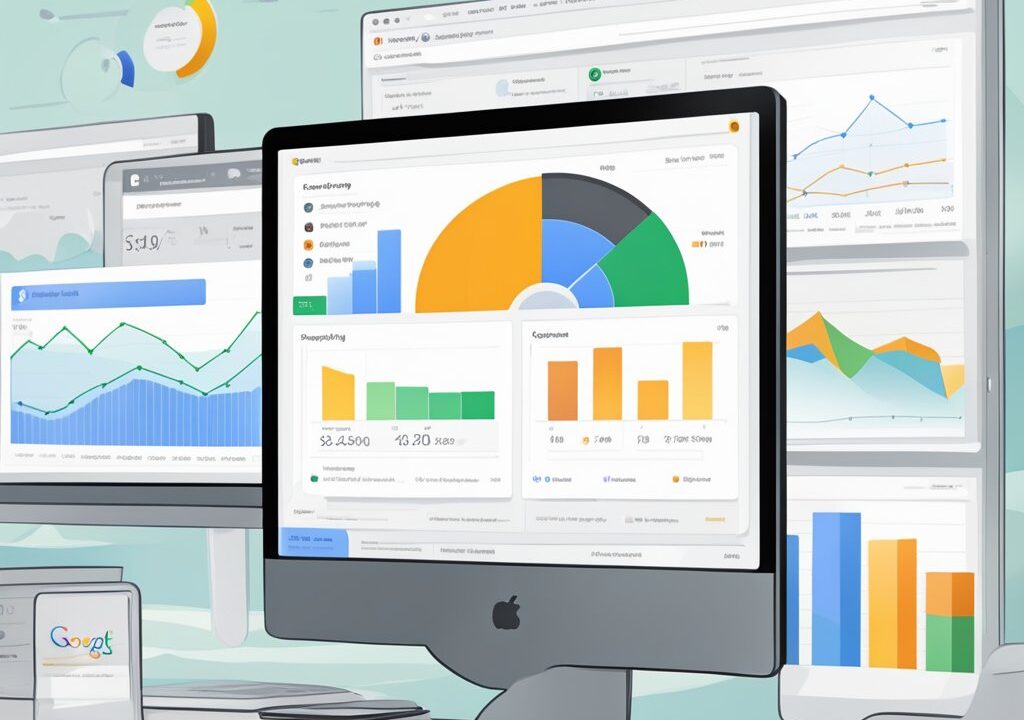Local SEO is crucial for businesses aiming to attract nearby customers through online searches. This specialised form of search engine optimisation focuses on improving visibility in local search results, helping brick-and-mortar establishments connect with potential patrons in their vicinity. Local SEO involves optimising a business’s web presence for increased visibility in local and localised organic search engine results.

For beginners venturing into local SEO, understanding the fundamentals is essential. This includes claiming and optimising business listings, ensuring consistent NAP (Name, Address, Phone number) information across online platforms, and leveraging customer reviews. These elements work together to boost a business’s prominence in local search results, making it easier for potential customers to find and choose their services.
Implementing effective local SEO strategies can significantly impact a business’s online presence and foot traffic. By focusing on targeted keywords, creating location-specific content, and building local backlinks, businesses can improve their chances of appearing in the coveted “local pack” of search results. This increased visibility can lead to more website visits, phone calls, and ultimately, in-store visits from local customers.
Key Takeaways
- Optimise business listings and ensure consistent NAP information across online platforms
- Create location-specific content and target local keywords to improve search visibility
- Monitor and respond to customer reviews to enhance online reputation and local search rankings
Fundamentals of Local SEO
Local SEO centres on optimising your online presence to attract nearby customers. It focuses on three key areas: understanding local search behaviour, maintaining consistent business information, and leveraging Google My Business effectively. This article will cover the basics, but an agency such as SEO Agency Bristol will be able to go into a lot more detail.
Understanding Local Search
Local search refers to queries with geographical intent. Users often include terms like “near me” or specific locations. Search engines use factors like IP address and GPS data to deliver relevant results.
Local search results typically feature a map with pinned businesses, followed by a list of local establishments. These listings include essential details such as the business name, address, phone number, and customer reviews.
To optimise for local search, businesses should:
- Include location-specific keywords in their website content
- Create location-specific pages for multiple branches
- Encourage customer reviews on various platforms
- Utilise schema markup to provide structured data to search engines
The Importance of NAP Consistency
NAP stands for Name, Address, and Phone number. Consistent NAP information across all online platforms is crucial for local SEO success.
Search engines cross-reference this data to verify a business’s authenticity and location. Inconsistencies can lead to confusion and lower rankings in local search results.
To maintain NAP consistency:
- Create a master document with correct business information
- Regularly audit online listings and directories
- Promptly update all platforms when changes occur
- Use a consistent format for addresses and phone numbers
Google My Business Optimisation
Google My Business (GMB) is a free tool that allows businesses to manage their online presence across Google’s services, including Search and Maps.
To optimise your GMB listing:
- Claim and verify your business profile
- Provide accurate and comprehensive information
- Choose relevant business categories
- Add high-quality photos and videos
- Respond to customer reviews promptly and professionally
Regularly update your GMB profile with posts, offers, and events to keep it fresh and engaging. This activity signals to Google that your business is active and relevant to local searchers.
On-Page SEO Strategies
On-page SEO strategies are crucial for improving local search visibility. These techniques focus on optimising website elements to make them more relevant and appealing to both search engines and users in specific geographical areas.
Keyword Research for Local Search
Local keyword research is essential for targeting the right audience. Start by identifying location-specific terms relevant to your business. Use tools like Google Keyword Planner to find popular local search phrases.
Consider long-tail keywords that include city names, neighbourhoods, or landmarks. For example, “best coffee shop in Manchester” or “plumber near Hyde Park”.
Create a list of location-based modifiers such as:
- Near me
- In [city/town name]
- [Service] + [location]
Analyse competitor websites to discover additional local keywords they’re targeting. This can provide insights into effective terms for your industry and area.
Optimising Meta Tags and Content
Meta tags play a vital role in local SEO. Craft unique, locally-focused title tags and meta descriptions for each page. Include your primary local keyword and location in these elements.
Example title tag: “Top-Rated Dentist in Birmingham | Smile Dental Clinic”
Optimise your content by naturally incorporating local keywords throughout your web pages. Include location-specific information in headers, body text, and image alt tags.
Create locally relevant content marketing such as:
- Area guides
- Local event coverage
- Community involvement highlights
Ensure your content addresses local customers’ needs and questions. This helps improve relevance and user engagement.
Local Landing Pages Creation
Develop dedicated landing pages for each location your business serves. These pages should contain specific information about your products or services in that area.
Key elements to include on local landing pages:
- Unique, location-specific content
- Local contact details and opening hours
- Embedded Google Maps
- Customer reviews from local clients
- Area-specific offers or promotions
Optimise each page’s URL structure to include the location, such as “www.yourbusiness.com/london-services“.
Ensure consistency in NAP (Name, Address, Phone number) information across all local landing pages. This helps search engines associate your business with specific locations, improving local search rankings.
Off-Page SEO Factors

Off-page SEO factors play a crucial role in improving local search visibility. These external signals help search engines assess a business’s reputation and relevance within its local community. Key areas of focus include citations, reviews, and local link building.
Building Local Citations
Local citations are mentions of a business’s name, address, and phone number (NAP) on various online platforms. Consistent and accurate citations across the web strengthen a business’s local search presence.
To build citations effectively:
- Claim and optimise Google Business Profile listing
- Submit business information to relevant online directories
- Ensure NAP consistency across all platforms
- Target industry-specific directories and local business associations
High-quality citations from authoritative sources can significantly boost local search rankings. It’s essential to regularly audit and update citations to maintain accuracy and relevance.
Managing Online Reviews and Ratings
Online reviews and ratings are vital for local SEO success. They provide social proof and influence search engine rankings. Positive reviews can enhance a business’s visibility and credibility.
Key strategies for managing reviews:
- Encourage satisfied customers to leave reviews
- Respond promptly and professionally to all reviews, both positive and negative
- Address concerns raised in negative reviews and seek resolution
- Monitor review sites regularly to stay informed of customer feedback
Google considers review signals when determining local search rankings. Businesses should focus on generating a steady stream of authentic, positive reviews across various platforms.
Local Link Building
Local link building involves acquiring high-quality backlinks from relevant local websites. These links signal to search engines that a business is an established and trusted entity within its community.
Effective local link building tactics:
- Participate in local events and secure links from event websites
- Sponsor local charities or sports teams
- Collaborate with other local businesses for cross-promotion
- Create valuable, localised content that attracts natural links
Local link building efforts should focus on quality over quantity. Links from reputable local sources, such as chambers of commerce, local news outlets, and industry associations, carry significant weight in local search algorithms.
Mobile SEO for Local Search
Mobile optimisation is crucial for local businesses aiming to capture nearby customers. A mobile-friendly website and fast loading speeds are essential elements for success in local search rankings.
Mobile-Friendly Website Design
A mobile-friendly website is vital for local businesses. Responsive design ensures your site adapts to different screen sizes, providing a seamless experience across devices.
Use large, easy-to-tap buttons and clear navigation menus. Implement click-to-call functionality for phone numbers, allowing users to contact your business directly.
Optimise images for mobile viewing to reduce load times. Consider using AMP (Accelerated Mobile Pages) for even faster loading on mobile devices.
Page Speed Optimisation
Page speed is a critical factor in mobile SEO. Faster-loading pages improve user experience and can boost search rankings.
Compress images and minify CSS, JavaScript, and HTML to reduce file sizes. Leverage browser caching to store static assets locally on users’ devices.
Consider using a content delivery network (CDN) to serve assets from servers closer to users’ physical locations. This can significantly reduce load times for mobile users.
Regularly test your site’s speed using tools like Google PageSpeed Insights and make improvements based on the recommendations provided.
Tracking Your Local SEO Performance

Measuring and analysing your local SEO efforts is crucial for optimising your strategy. Proper tracking allows you to identify what’s working, what needs improvement, and where to focus your resources for maximum impact.
Setting Up Local SEO KPIs
Key Performance Indicators (KPIs) are essential for gauging the success of your local SEO campaign. Start by establishing clear, measurable goals aligned with your business objectives. Common local SEO KPIs include:
- Google Business Profile views and interactions
- Local search rankings for target keywords
- Click-through rates from local search results
- Number of online reviews and average rating
- Website traffic from local searches
Set realistic targets for each KPI and review them regularly. This approach helps you stay focused on meaningful metrics rather than vanity numbers.
Using Analytics for Local SEO
Website Analytics is a powerful method for tracking local SEO performance. It provides valuable insights into user behaviour and website performance. To maximise its effectiveness:
- Set up location-specific landing pages and track their performance.
- Use UTM parameters to monitor traffic from different local sources.
- Create custom reports to focus on local metrics.
Additionally, leverage Google Search Console to analyse your website’s performance in local search results. Monitor impressions, clicks, and average position for location-based queries. This data helps identify opportunities for improvement and areas where you’re outperforming competitors.
Frequently Asked Questions
Local SEO can be complex, but these common questions address key areas for optimisation. They cover strategies, checklists, and best practices to improve visibility and attract local customers.
How do I create a local SEO checklist for effective optimisation?
A comprehensive local SEO checklist should include optimising your Google Business Profile, ensuring consistent NAP (Name, Address, Phone) information across all online platforms, and gathering positive customer reviews. It’s crucial to create location-specific content and build local backlinks.
Include schema markup on your website to help search engines understand your business information. Regular website audits and keyword research focused on local terms are also essential components of an effective checklist.
Can you provide some examples of successful local SEO strategies?
Successful local SEO strategies often involve creating location-specific landing pages for businesses with multiple locations. This approach helps target specific local keywords and provides relevant information to users in different areas.
Another effective strategy is partnering with local influencers or businesses for cross-promotion, which can boost local visibility and credibility. Implementing a local content strategy, such as creating neighbourhood guides or highlighting local events, can also significantly improve local search rankings.
What steps should small businesses take to improve their local SEO?
Small businesses should start by claiming and optimising their Google Business Profile. This includes adding accurate business information, photos, and responding to customer reviews promptly.
Creating locally relevant content, such as blog posts about community events or area-specific services, can boost local SEO. Encouraging satisfied customers to leave online reviews and building citations on local directories are also crucial steps for small businesses.
What are the various types of local SEO and how do they differ?
Local SEO can be categorised into on-page and off-page optimisation. On-page local SEO involves optimising website content, meta tags, and internal linking structure with local keywords and information.
Off-page local SEO focuses on building local citations, managing online reviews, and creating local backlinks. Another type is technical local SEO, which includes optimising website speed, mobile-friendliness, and implementing schema markup for local businesses.
Why is local SEO considered crucial for business visibility online?
Local SEO is vital because it helps businesses appear in location-based searches, which often have high conversion rates. It enables businesses to compete effectively in their local markets by targeting specific geographic areas.
With the rise of mobile searches and “near me” queries, local SEO has become essential for capturing potential customers actively looking for nearby products or services. It also helps build trust and credibility within the local community.
What strategies are most effective for local search engine optimisation?
Effective local SEO strategies include optimising for voice search, as many local searches are performed via voice assistants. Creating and maintaining accurate Google Business Profile listings is crucial for appearing in local pack results.
Developing a review management strategy to encourage and respond to customer reviews can significantly impact local rankings. Implementing local schema markup and creating location-specific content are also highly effective for improving local search visibility.




